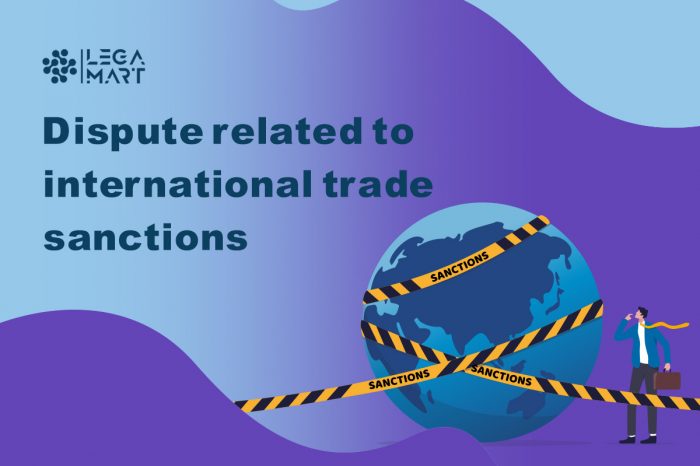International disputes
International disputes arise when there is a conflict between two or more countries or between an individual or company from one country and another individual or company from another country. These disputes can arise due to a variety of reasons, including breach of contract, violation of intellectual property rights, or disagreement over trade policies. In such cases, it is important to understand the relevant international laws and regulations that govern the dispute. The parties involved should seek legal advice from experienced international lawyers who can help them navigate the complex legal landscape and find a resolution that is acceptable to all parties.
Find best lawyers for International disputes
Issues related to International disputes
Techniques for peaceful settlement of international disputes are negotiation, inquiry, mediation, conciliation, arbitration, judicial settlement, resort to regional agencies or arrangements, or their own choice. Arbitration is the most effective and equitable means of dispute settlement. It combines both diplomatic and judicial procedures.
One of the first things to consider when looking for an authority to settle an international dispute is whether or not both parties have recognised the authority as legitimate. In most cases, both parties must agree to submit to the authority’s decision.
Another factor to consider is the geographical location of the authority. Some authorities are based in a specific country or region, while others have a more global reach. If the parties involved in the dispute are located in different parts of the world, it may be necessary to look for an authority with jurisdiction over both regions.
Finally, it’s essential to consider the type of authority you want. There are many different types of authorities available.
The applicable law to an international dispute will be the law of the country where the dispute occurs. This is because that is where the court system that will hear the case is located. However, if a party to the dispute can demonstrate that another country’s law would be more appropriate, then that law may be applied. It depends on the nature of the dispute. For example, if you have a contract dispute, you would look to the law of the country where the contract was made. If you have a property dispute, you will look to the law of the country where the property is located.
If neither party is a resident of any country involved in the dispute, you should consult with an international law expert to help resolve it. Disputes Resolution Panels will look to the most closely connected domestic law to resolve a dispute. For example, if parties argue about whether a contract was performed correctly in French law & one party is from Peru.

If you are involved in a dispute, arbitration can be a helpful way to resolve the issue without going to court. Here are four reasons why you might choose arbitration:
- Arbitration is often faster than going to court. As a result, the process can be streamlined, and hearings can be scheduled quickly.
- Arbitration is usually less expensive than litigating in court. You may save on costs such as filing fees and attorney’s fees.
- Arbitration is typically confidential. What happens in arbitration stays in arbitration – unlike court proceedings, which are public records.
- You may have more control over the outcome of your case in arbitration than you would in court.
Hiring a lawyer is often the best way to ensure you reach a fair and equitable settlement. A good lawyer will have extensive experience negotiating complex international disputes and be well-versed in all applicable laws and regulations.
Latest Articles
Tell us more about your problem.
Please give a brief description about what it is you need to talk to our lawyers about ?
Frequently Asked Questions
How can I resolve a dispute with an international business partner?
Resolving a dispute with an international business partner can be challenging, but there are several steps you can take to help resolve the issue:
Try to Resolve the Dispute Amicably: The first step is to try to resolve the issue through direct communication with your partner. This can involve discussing the issue and trying to find a mutually acceptable solution.
Seek Mediation: If direct communication fails to resolve the issue, you can consider engaging a mediator who can help facilitate negotiations between the parties.
Arbitration: If mediation does not work, arbitration is another option that involves having an impartial third party make a binding decision on the dispute. This process can be quicker and less expensive than litigation.
Litigation: Litigation should be considered as a last resort because it can be expensive and time-consuming. However, if all other options fail, litigation may be necessary to resolve the dispute.
Consult Legal Counsel: It’s important to consult with legal counsel who is familiar with the laws and regulations of both countries involved in the dispute. They can advise you on the most effective strategies for resolving the dispute and protect your interests.
Review the Contract: You should review the contract carefully to determine if there are any provisions that address dispute resolution. The contract may require parties to engage in specific dispute resolution procedures.
Keep Communication Open: Throughout the dispute resolution process, it’s important to keep communication open and maintain a professional demeanor. This can help minimize misunderstandings and facilitate progress towards a resolution.
By taking these steps, you can increase the likelihood of reaching a successful resolution with your international business partner.
What are the differences in dispute resolution mechanisms between the United Kingdom and China?
The United Kingdom and China have different legal systems and dispute resolution mechanisms, here are some of the key differences:
Legal System: The UK has a common law system, while China uses a civil law system. This means that the legal principles and sources of law are different in each country.
Court System: The UK has a hierarchical court system, with lower courts hearing cases first and higher courts hearing appeals. In China, there are specialized courts for certain types of cases, such as intellectual property or maritime disputes.
Mediation: Mediation is commonly used in both countries to resolve disputes outside of court. In the UK, mediation is voluntary, while in China, it is often mandatory before a case can proceed to court.
Arbitration: Arbitration is a popular method of dispute resolution in both countries. However, in the UK, arbitration is governed by the Arbitration Act 1996, while in China, it is governed by the Arbitration Law of the People’s Republic of China.
Enforcement of Judgments: In the UK, judgments from other countries can be enforced through the country’s domestic courts, provided that certain conditions are met. In China, the enforcement of foreign judgments can be difficult, as China is not a signatory to the Hague Convention on Recognition and Enforcement of Foreign Judgments.
Legal Representation: In the UK, parties are free to choose their legal representation. In China, only Chinese-licensed lawyers can represent parties in Chinese courts.
Language: Court proceedings in the UK are conducted in English, while in China they are conducted in Mandarin. Translation services may be required in either country for parties who do not speak the language of the court.
These differences can impact how disputes are resolved between parties from the UK and China, and it’s important to seek appropriate legal advice when dealing with cross-border disputes.
How can I minimize the risk of disputes when conducting international business?
There are several steps you can take to minimize the risk of disputes when conducting international business:
Conduct Due Diligence: Before entering into a business relationship with an international partner, it’s important to conduct thorough due diligence on the company and its principals. This can include reviewing financial statements, analyzing market trends, and researching the company’s reputation.
Develop Clear Contracts: Contracts should be clear and specific, outlining the rights and responsibilities of each party, including dispute resolution mechanisms. It’s important to work with legal counsel who has experience navigating the laws and regulations of the countries involved in the business relationship.
Communicate Effectively: Open and transparent communication can help prevent misunderstandings that can lead to disputes. It’s important to communicate regularly and clearly with your international partner and to document communication in writing.
Manage Expectations: Managing your partner’s expectations is critical to avoiding disputes. This includes being upfront about timelines, costs, and potential risks associated with the business relationship.
Maintain Professionalism: It’s important to maintain a professional demeanor throughout the business relationship, even if disagreements arise. Avoid making personal attacks or engaging in unprofessional behavior that erodes trust and respect.
Implement Quality Control Measures: Implementing quality control measures can help minimize the risk of disputes related to product or service quality. This includes setting clear standards and procedures for manufacturing, shipping, and customer service.
Stay Up-to-Date on Regulations: Laws and regulations pertaining to international business can change frequently. It’s important to stay up-to-date on changes to regulations that may impact your business relationship, and to seek legal advice when necessary.
By taking these steps, you can help minimize the risk of disputes when conducting international business and ensure a productive and mutually beneficial business relationship.












